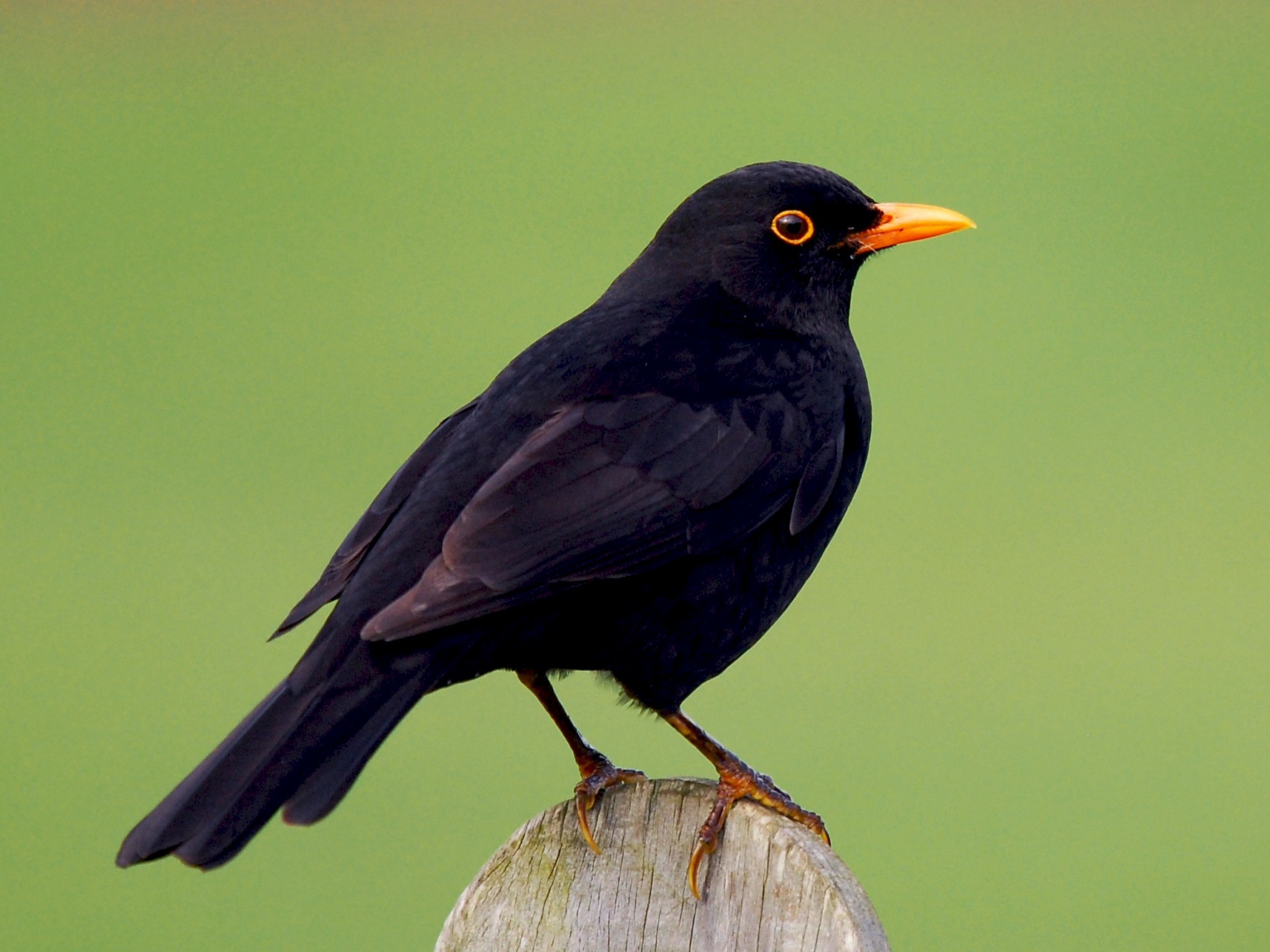Blackbird Food & Blackbird Seed Online
19 products
10% off ALL bird feed this January! Automatically applied at checkout
5% Off Your First Order! Code: FIVE at Checkout
19 products
Feeding a family of blackbirds that may have found themselves in or around your garden is a wonderful thing - knowing that you're helping the local ecosystem through the power of feeding one small part of it is wonderful.

There's no better option than our range of blackbird feeding options.
While blackbirds are opportunistic omnivores, there are certain options, which we'll discuss here, that work really well to attract blackbirds.
The food and seed that we stock have these attractive food sources in abundance, ensuring that any blackbirds in your garden will be happy and repeat visitors.
Blackbirds eat a whole range of things, from plants to insects to any other odds and ends that they can get their beaks on.
They're omnivores, meaning that their digestive systems are quite generalized, so they'll be perfectly happy to eat nearly anything.
As a general rule of thumb, birds prefer small food sources (so that they can eat them with their small beaks), which are quite protein dense.
This is why birds head for seeds, nuts, and insects before heading for berries or something similar.
Feeding birds in your garden is a great way to support the local ecosystem.
In the modern world, it's very easy to become divorced from the concept of an interconnected ecosystem, the pieces of which are separate from one another. In reality, this certainly isn't the case.
Instead, birds are a small part of a vast and effortlessly complex ecosystem that is well balanced.
During nesting season, for example, blackbirds will gather up twigs and leaf litter to make their nests. This clears a path for ground insects, allowing them to live their life a little more simply.
The most efficient way to support the entire ecosystem via birds is to opt for a switching spring and summer diet.
That is to say that it makes sense to offer different things at different times of the year. During the summer, bugs are plentiful, so blackbirds eat plant matter a little more happily. During the winter, they'd likely prefer bugs to other options.
A bird table is a great way to feed birds, especially birds as confident, clever, and large as most garden birds are.
Blackbirds are very clever and will happily sit on a bird table awaiting food, since they know it's a safe spot.
To ensure that you get blackbirds on your bird table, we would ensure that your bird table is big enough for one or two of them.
While they're not monstrously huge, blackbirds prefer a little room while sitting or standing somewhere. Therefore, a larger table is a better table for wild birds.
Blackbirds eat various things throughout the year, with their favorite food shifting a little over time.
During the summer, they function primarily as ground-feeding birds. There are a lot of bugs around in the summertime, and they're happy to walk around in search of them.
To a blackbird, earthworms are a wonderful snack - very high in protein, with little effort required to actually get them.
They can watch soil from trees and see when the soil is moving or has recently been turned over. When they see that, they swoop down and look for worms.
During the winter, blackbirds' favorite foods shift to be more plant-based since bugs typically die in the autumn and spawn in the spring.
With this lack of worms, blackbirds feed on nuts, berries, and other types of foliage that they might be able to find.
As we've said before in this article - blackbirds are out-and-out opportunists. They'll eat almost anything that they come across.
A blackbird's ultimate favorite food is the earthworm.
They love swooping down when the soil has been turned, wetted, or moved. When they're there, they'll happily scratch through clods of earth to find the worms.
However, it's unlikely that gardeners feeding blackbirds would want to toss a handful of worms into their flowerbeds, and we don't blame anyone for that.
Instead, we suggest tracking down some bird food high in insects.
Typically, these will be dried mealworms but can be nearly any insects. Bird food that's designed to attract birds like blackbirds will be high in insects and will typically say so on the label.
Make sure to read the label of any bird food that you're thinking of buying to check if it has the right proportions of different ingredients in it.
Blackbirds eat nearly any fruit that they like since they're opportunistic feeders. With that said, though, they are quite soft-billed birds.
Therefore, both female blackbirds and male blackbird tends to prefer softer fruit, such as berries. As a general rule of thumb, try to source berries that have been grown in your country or could have been.
For example, in the UK, we might consider offering blackbirds blackberries, raspberries, or strawberries. These are all great options, and the birds will love them.
The reason they'll love them is that UK birds have evolved in the UK to eat UK berries. Blackberries, raspberries, and strawberries can all be grown in the UK and so will be suitable for blackbirds.
It doesn't matter at all if the berries are imported, just consider whether they could be grown in the UK, in theory - if they could be, then blackbirds will likely be happy to eat them.
Yes, blackbirds love eating bananas! When peeled and offered to them, the soft flesh and high sugar content is very appealing to our feathered friends.
In theory, their love of bananas is the same as blackbirds' love of soft berries - if it's soft enough to get their beak into, they'll adore the fruit itself for its high sugar content.
Yes, blackbirds will certainly eat dog food! Take care, though, blackbirds eat anything, including things that could make them sick.
They shouldn't really be eating wet dog food from a tin or a sachet. Instead, dry kibble or biscuits is a better option.
To really be on the safe side, consider soaking the kibble or biscuits before filling your hanging feeders with it.
They can choke on rigid chunks of food, so to make dog kibble into bird food, soaking is wise.
In the wild, birds will eat mostly insects, with some nuts and berries thrown in when they're in season.
This is a handy thing to know, as it allows you to offer the thing that's not up for grabs when they want it most.
For example, blackbirds eat a lot of insects in the summer. Therefore, they aren't eating a lot of berries and nuts.
In the summer, it makes sense to fill your hanging feeders with nuts and seeds. This wild bird food will function as a great way to bring blackbirds to your garden.
During winter, blackbirds tend to eat nuts and berries - things from plants that they can get their beaks on.
Since the ground is dense and frozen, they can't get to the earthworms that they'd ideally love too much on.
Instead, bird feeders packed with wild bird food made from nuts and seeds are a great option.
If you grow sunflowers in your garden, then offering up some sunflower hearts to the blackbirds in the winter can be a great way to support them easily. They love the sunflower hearts, especially in winter, because they're so packed full of seeds that they can eat. This is vital for the winter.
Blackbirds catch earthworms by working as opportunistic predators. They know that earthworms live under the top layer of the soil, burrowing to and fro.
Therefore, they know that worms are likely to come to the surface when the soil has been overturned or wetted.
They'll swoop down onto the soil at this point, scraping through chunks of earth to find their quarry. It's not a particularly complex way of hunting for prey, but it works wonderfully well. The thrush family all exhibits behavior like this, so blackbirds doing this is quite in character for them.
If you've got little to nothing to offer blackbirds, even seeds or something similar in hanging bird feeders, a great option is to offer them a small piece of processed food you might be eating.
Throwing them a potato chip or something similar will be sure to attract more - processed food's fats, sugars, and complex nutrient content makes it a handy last resort if you're looking to feed blackbirds in a pinch.
Subscribe today and get 10% off your first purchase




































